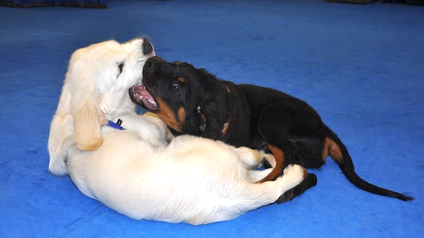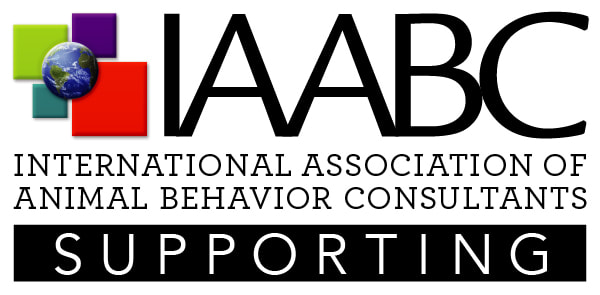
Stop and think. When is the last time someone yelled at you or even just spoke very sternly to you? Did that experience affect your feelings toward that person? I don't know about you, but I find being on the receiving end of a reprimand of any sort to be very upsetting. Of course, some people find it relatively easy to let this kind of thing roll right off. I'm not one of them.
Similarly, some dogs are more tolerant of yelling or verbal "correction" than others, but I can assure you that if you yell, you are damaging your relationship with your dog. It may not be apparent in the moment. In fact, your dog may respond immediately to a harsh tone, but you are bound to experience the effects later on.
I want to be the most wonderful person in the world to my dog. In order to do that, I need to be predictably happy when I interact with her. If I create any doubt in my dog's mind as to how I might treat her, I have driven a wedge of some sort between us. Have I ever yelled at my dog? Yes, I have because I am human and I sometimes get frustrated. It's not something that I want to do, but every so often, a bad mood gets the best of me. I can tell you, however, that I never use yelling or even stern speaking as a way of teaching my dog what I do and do not want.
We are currently experiencing a windfall of discovery in the area of canine cognition and it is becoming very clear that the basic structure of dog brains and human brains is quite similar. We know for a fact that a stressed person is less capable of learning than a happy, relaxed person. If you want to read about this, check this out: The Neuroscience Behind Stress and Learning by Judy Willis. Think about your favorite teachers. Most of us learned most efficiently from people who inspired us rather than those who scared us. That doesn't mean that those benevolent teachers allowed us get away with not working. On the contrary, I think most often we are more motivated by teachers who expected a lot from us, but who motivated us to want to do the work. Dogs really are no different.
I have worked with clients who have had a terrible time getting their dogs to come when they called. The most common cause of the problem was that the person had a history of being harsh or yelling at his/her dog. The yelling may not have been directly related to the dog's recall. In fact, more often than not the reprimand had absolutely nothing at all to do with training that particular behavior, but had somehow crept into other interactions between the dog and person. Each and every time we make the choice to yell at our dogs, we erode the relationship between us.
For some reason, our culture has embraced the idea of yelling as an effective way to discipline our dogs. In the past, when we mistakenly thought that we had to "dominate" our dogs and show them who's boss, it was understandable. Recent scientific studies have taught us that this is a false way of looking at canine behavior. (If you want to read a bit about this, see this article by Patricia McConnell.) In light of all the work that has been done on canine cognition, we should know better. Think about the people you respect and love the most. I doubt very much that they are verbally abusive. Your dog will thank you for remembering to choose a positive and clear way of communicating.
Similarly, some dogs are more tolerant of yelling or verbal "correction" than others, but I can assure you that if you yell, you are damaging your relationship with your dog. It may not be apparent in the moment. In fact, your dog may respond immediately to a harsh tone, but you are bound to experience the effects later on.
I want to be the most wonderful person in the world to my dog. In order to do that, I need to be predictably happy when I interact with her. If I create any doubt in my dog's mind as to how I might treat her, I have driven a wedge of some sort between us. Have I ever yelled at my dog? Yes, I have because I am human and I sometimes get frustrated. It's not something that I want to do, but every so often, a bad mood gets the best of me. I can tell you, however, that I never use yelling or even stern speaking as a way of teaching my dog what I do and do not want.
We are currently experiencing a windfall of discovery in the area of canine cognition and it is becoming very clear that the basic structure of dog brains and human brains is quite similar. We know for a fact that a stressed person is less capable of learning than a happy, relaxed person. If you want to read about this, check this out: The Neuroscience Behind Stress and Learning by Judy Willis. Think about your favorite teachers. Most of us learned most efficiently from people who inspired us rather than those who scared us. That doesn't mean that those benevolent teachers allowed us get away with not working. On the contrary, I think most often we are more motivated by teachers who expected a lot from us, but who motivated us to want to do the work. Dogs really are no different.
I have worked with clients who have had a terrible time getting their dogs to come when they called. The most common cause of the problem was that the person had a history of being harsh or yelling at his/her dog. The yelling may not have been directly related to the dog's recall. In fact, more often than not the reprimand had absolutely nothing at all to do with training that particular behavior, but had somehow crept into other interactions between the dog and person. Each and every time we make the choice to yell at our dogs, we erode the relationship between us.
For some reason, our culture has embraced the idea of yelling as an effective way to discipline our dogs. In the past, when we mistakenly thought that we had to "dominate" our dogs and show them who's boss, it was understandable. Recent scientific studies have taught us that this is a false way of looking at canine behavior. (If you want to read a bit about this, see this article by Patricia McConnell.) In light of all the work that has been done on canine cognition, we should know better. Think about the people you respect and love the most. I doubt very much that they are verbally abusive. Your dog will thank you for remembering to choose a positive and clear way of communicating.








 RSS Feed
RSS Feed


